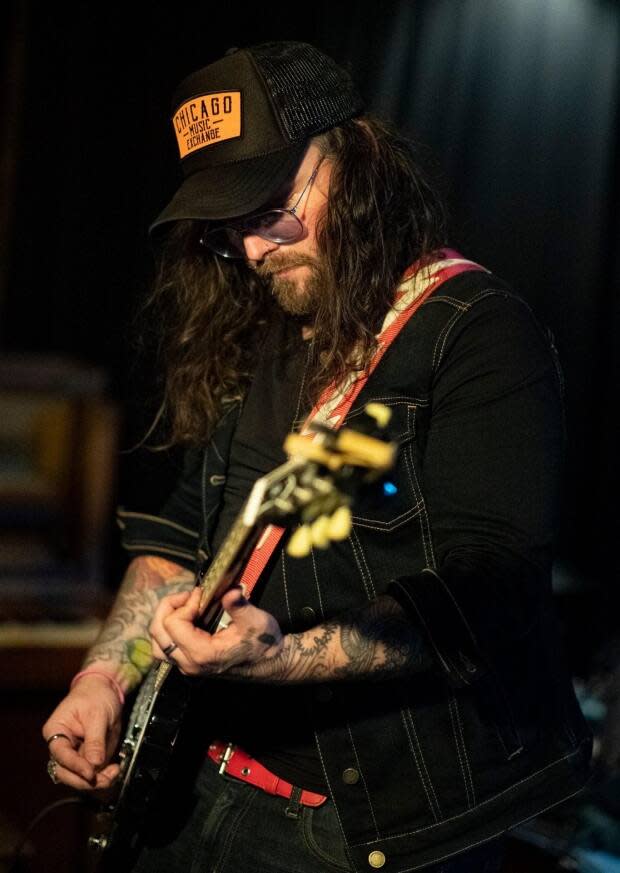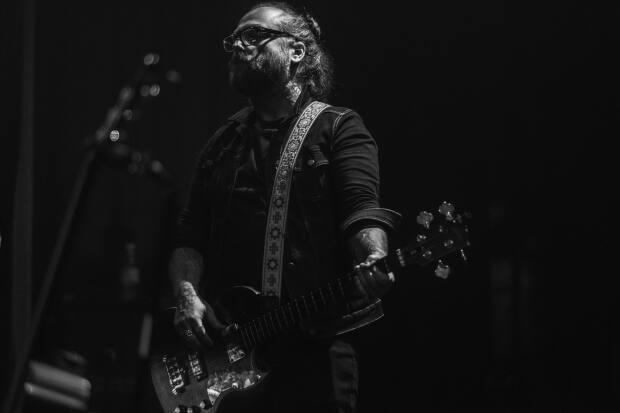Tiber Reardon's keys to musical improv are eloquence and empathy


Tiber Reardon says he wants his first solo album to begin and end with the sound of an airport.
"Airports are just fascinating to me," he says. "It's not really a place. You go there to go somewhere."
"Not really a place" might be how many folks would perceive his ambient, improvisational performances. This summer, Reardon was one of two recipients to receive the Gerry Porter Award for Creative Improvised Music at the 2022 Sound Symposium in St. John's. The award honours the life of Gerald C. Porter, a St. John's visual artist, designer and humorist who loved boundary-pushing music.
Reardon says he intends to use the $1,000 prize money to support an upcoming recording project.
"I'm trying to secure funding to record an album in the fall, so probably that's where the money is going to go."
A veteran musician
The 44-year-old St. Anthony native has been an active member of the St. John's music scene since he moved to the city in 2005. He has supported numerous musicians, including Kellie Loder, Mark Bragg and Chris Picco. A volunteer with the Sound Symposium, Reardon is a regular at Night Music, an experimental music event that takes place at the Ship Pub on the third Thursday of every month.
In addition to solo improvisational performances, Reardon plays in a band called Atomic Clock with Chris Donnelly, Michelle LaCour and Josh Ward.
"Our schtick is that we never, ever plan. We book gigs and we show up with instruments."
They occasionally create artistic constraints to guide their improvisation.
"On one occasion we came into a gig with four chords prescribed, like, 'Let's at some point play these four chords together.' But otherwise, we'll play an hour gig, and somebody'll make a sound and all of a sudden, we're jamming like crap and it's deadly."

Music as experience rather than message
Reardon says he enjoys making music that creates an emotional or esthetic experience for the listener.
"Even when I was a kid, I was fascinated by music, I listened to music all day, every day," he says. "And it was only the last few years that I even started paying attention to what the words were."
Rather than conveying a distinct message, he is interested in "the sounds of the words, the alliteration, the words as percussion, and the words as a melody."
"Mindfulness changed my life," says Reardon, who advocates mental health awareness for all people, not only those with mental illness. He uses social media to share brief pieces of improvised music, which he calls two-minute meditations.
"When somebody hears it, because there are no words and there's no suggestion as to what the tone is.… This combination of sounds is up to you what it makes you feel."
Improv as a conversation
When asked to compare the value of improvised music to that of conventional prescribed songs, Reardon likens it to a conversation.
"There's a topic sentence and there's topic changes. I'll speak for a bit, then I'll back out, then you can say something. Then all of a sudden, we're all talking at the same time. And then we drop out."
That also goes for when it's time to stop playing.
"It's like when you have a chat, you can tell when you're done talking about a particular thing. It's not like, 'OK, we're going to stop talking about this now.' You just feel it."

Like a good conversation, Reardon says, an improvised musical performance requires more than skill.
"We've all had a situation where somebody in a group conversation bloviates and uses big, snazzy words to show off. That's a person who is eloquent but doesn't care about the conversation."
Reardon likes to temper his musical eloquence with empathy, combining expertise with a sensitivity to his fellow players and audience.
"When improvised music is done correctly — and I use that term very loosely — it's when the people involved are connected and listening to each other."
Does the jamming ever get into a jam?
"There's always a risk of that being a train wreck but it never ever has been, because everyone can play their instruments, and everyone listens to each other."
An album to 'be present' with
For his upcoming album project, you might say he's playing it by ear.
"The point is going to be to elicit some kind of feeling or emotion, maybe imagery." He says he intends it to be a combination of what he calls "real songs" and ambient soundscapes. "The goal is for it to have some kind of emotional continuity."
Reardon continues, "People put a lot of effort into saying something meaningful, but I've always been focused on how a piece of music, which happens to have lyrics, makes me feel a certain way."
Of both this planned album and his meditation pieces, Reardon says he wants to provide a musical space for the listener to "be mindful and present with the sounds."


